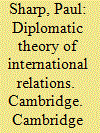| Srl | Item |
| 1 |
ID:
100917


|
|
|
|
|
| Publication |
Cambridge, Cambridge University Press, 2009.
|
| Description |
x, 339p.
|
| Series |
Cambridge studies in international relations
|
| Standard Number |
9780521757553
|
|
|
|
|
|
|
|
|
|
|
|
Copies: C:1/I:0,R:0,Q:0
Circulation
| Accession# | Call# | Current Location | Status | Policy | Location |
| 055559 | 327.2/SHA 055559 | Main | On Shelf | General | |
|
|
|
|
| 2 |
ID:
049159


|
|
|
|
|
| Publication |
London, macmillan Press, 1997.
|
| Description |
xviii, 269p.
|
| Series |
Contemporary History in Context Series
|
| Standard Number |
0333658426
|
|
|
|
|
|
|
|
|
|
|
|
Copies: C:1/I:0,R:0,Q:0
Circulation
| Accession# | Call# | Current Location | Status | Policy | Location |
| 038951 | 327.41/SHA 038951 | Main | On Shelf | General | |
|
|
|
|
| 3 |
ID:
052967


|
|
|
|
|
| Publication |
Aug 2004.
|
| Summary/Abstract |
Inthe late 1950's, the British hitorian Sir Herbert Butterfield observed that we should not welcome the prospect of even a cituous hegemon but should seek, rarher a balance of power. He did so because his understsnding of history suggested that aspirant hegemons succeed principally in precipitating costly wars against them, while his sense of Christian ethics suggested that even a successful virtuous hegemon would become self-righteous and, by imposing its values on others, would curtail the scope of human freedom. I argue that current United States (U.S.) policy and the world's response to it to date confirm Butterfield's position, but that this presents a new set of practical and moral questions centered on the problem of advocating a balance against a country that one regards as broadly virtuous, and certainly more virtuous than many of the other powers in the world, but no longer wants to pursue its intersts through the post- Cold War concert of putative great powers. The best answer to these problems, I conclude, lies not in a crude balance, but the re-institutionalization of the idea of the balance of the power. This requires advocating restraint and self-restraint, the first practical manifestation of which being that the U.S. should not attack either of the surviving members of the "Axis of Evil."
|
|
|
|
|
|
|
|
|
|
|
|
|
|
|
|